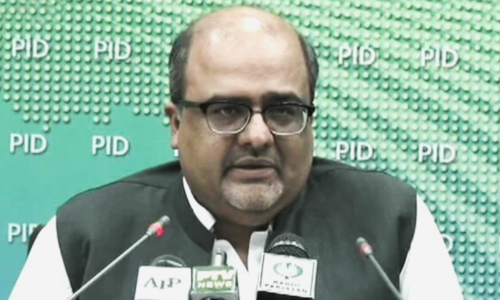THE recent nine-page judgement of the Islamabad High Court regarding the alleged illegal exercise of executive powers by an adviser to the prime minister has clarified many legal questions, removed a number of ambiguities, and at the same time, raised some new questions about the role and functions of the unelected advisers and special assistants to the prime minister (SAPMs).
The judgement has come at a time when there is an increasing tendency in the government to appoint unelected cabinet-level public officials, some of whom are apparently performing executive functions. Before the recent resignations by two SAPMs, the number of SAPMs had hit the highest ever figure of 15 in Pakistan’s 73-year history. Four of the current SAPMs hold the status of federal minister while the other four enjoy the status of minister of state. These SAPMs are in addition to five advisers, all of whom are assigned the status of federal minister.
Although the main plea of the petitioner to remove Adviser to the Prime Minister Shahzad Akbar as chairman of the Assets Recovery Unit was not granted by the court, partly because a similar objection was raised before the Supreme Court which has yet to deliver its “detailed verdict”, Chief Justice Athar Minallah of the Islamabad High Court, in his judgement, made some extremely important points.
One of them was that “Appointing an Adviser with the status of a Minister does not empower him/her to act or function as a Minister or to perform functions under the Rules of 1973 …”. He delved deeper into the federal government’s Rules of Business, 1973, and stated that the minister’s definition given in the Rules “neither includes an ‘Adviser’ nor a ‘Special Assistant’”. He went on to add: “The Special Assistant or Special Assistants in a Division or Ministry are not one of its officials.”
The judgement has also clarified that an adviser is not part of the federal cabinet.
The honourable chief justice of the Islamabad High Court also discussed in the judgement the question of decision-making and formulation of policies in the government, and stated that policy formulation and related decision-making fell “exclusively within the domain of the Prime Minister and the Minister holding the portfolio”. He went on to candidly pronounce that “An Adviser has no role either in policy matters of a Division or Ministry nor its execution and running the business of the Federal Government.…”
Negating a widespread perception, the judgement has also clarified that an adviser is not part of the federal cabinet nor entitled to attend its meetings except where the prime minister requires his/her attendance and, that too, by special invitation as has been provided in Rule 20 (1A) of the Rules of Business, 1973.
The same rule, however, authorises the prime minister to extend a special invitation to ministers of state, advisers, special assistants and other dignitaries to attend any or all meetings of the cabinet by special invitation. Had the specific reference to “all meetings of the cabinet” not been made in the rules, it could be inferred that the spirit of the rule was to allow these categories of persons to attend one or a few odd meetings, but the rule seems to clearly extend the scope of attending by special invitation to all cabinet meetings.
Some of the advisers and special assistants have been frequently addressing press conferences and proclaiming government policies in the mass media. The judgement seems to have disapproved or at least discouraged such a practice by stating that Rule 55 (4) would be breached if an adviser or an authority not specified in the rules were authorised to act as an official spokesperson.
But a question arises here because of Article 93 (2) of the Constitution which gives the right to an adviser to the prime minister to speak in either house of parliament and participate in committee proceedings. Doesn’t this constitutional right make the adviser an official spokesperson even if it is within the precincts of parliament? Moreover, if advisers are entitled to act as spokespersons within the august houses of parliament, how can they be denied this right outside?
One of the most important parts of the judgement deals with the question of whether any part of the executive authority can be exercised by the advisers and SAPMs. According to the judgement, an adviser cannot interfere in or in any manner influence the executive authority, working or functioning of a division/ministry nor its policy matters. The judgement has based this part of the verdict on the fundamental principle of the Constitution that the “State shall exercise its powers and authority through the chosen representatives of the people”.
The judgement further reinforces this verdict by stating that any act of an adviser in breach of the constitutional provisions and the Rules of 1973 will be void, without lawful authority and jurisdiction. Not only this, the judgement further cautions the heads of the divisions/ministries by stating that “it is the duty of every Secretary to ensure that business is conducted and functions performed strictly in accordance with the scheme of the Rules of 1973 and that no one is allowed to interfere in breach thereof”.
With these clear stipulations, the role of advisers and, by extension, special assistants, has been clearly defined, unless, of course, the Supreme Court takes a different position in the days to come. One may also infer that advisers and SAPMs can literally only advise and assist the prime minister while dealing with him and his immediate staff and that the advisers and SAPMs do not have a reporting relationship with the officials and staff of the ministries or divisions.
One may, therefore, conclude from the judgement that the practice of assigning ministries and divisions to advisers and special assistants as de facto ministers or ministers of state will no more be possible or at least easy.
The writer is president of the Pakistan Institute of Legislative Development And Transparency.
Twitter: @ABMPildat
Published in Dawn, September 5th, 2020














































